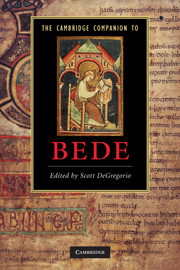Book contents
14 - Bede and the continent in the Carolingian age and beyond
from Part III - Reception and Influence
Published online by Cambridge University Press: 28 January 2011
Summary
When the Venerable Bede composed the literary autobiography that closes the final chapter of his Ecclesiastical History of the English People, he wrote out of concern for his legacy and for the benefit of future readers of his works. According to his own humble description, the primary purpose of his literary endeavours had been to clarify the Holy Scriptures and their interpretation 'for [his] own benefit and for that of [his] brothers' (V. 24, p. 567). Taken at face value, these words suggest that Bede wrote mainly for his fellow monks, the present and future members of his own twin community of Wearmouth-Jarrow. Indeed, there can be little doubt that the local brethren were a concern of his, but at the same time there is ample evidence that he thought his works would reach a much wider audience. After all, if he truly had thought that his works were going to remain within his own monastic family - among those who knew him well and who could be relied upon to keep his memory alive - why would he have composed an autobiographical sketch in the first place, and especially one in which he speaks of his brethren in the third person? The autobiographical sketch itself demonstrates that he envisioned his works reaching a wider audience.
- Type
- Chapter
- Information
- The Cambridge Companion to Bede , pp. 201 - 215Publisher: Cambridge University PressPrint publication year: 2010
- 7
- Cited by

